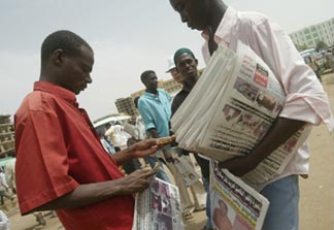Sudan security seizes copies of 11 newspapers in a week: RWB
March 13, 2014 (KHARTOUM) – Security officials in Sudan have seized copies of 11 newspapers in less than a week, as authorities continue to impose tough measures on media outlets, Reporters Without Borders (RWB) said in a statement on Monday.

Cléa Kahn-Sriber, the head of RWB’s Africa desk, described the latest round of seizures as “only a drop in the ocean of arbitrary measures” taken against the media by the National Intelligence and Security Service (NISS).
“This particular harmful strategy of seizing already printed newspapers amounts to a de facto suspension of publications without having to come up with legal motives and while condemning these papers to a slow financial agony. Another side effect of this tactic is the self-censorship editors impose on themselves in order to avoid their papers being confiscated,” said Kahn-Sriber.
She said the seizure of English language newspapers and pro-government papers indicated the Sudanese government is becoming more radical in its censorship.
Among the newspapers targeted was the pro-government Al Hurra, which was confiscated on 8 March for the fourth time in six days.
Al Hurra was earlier targeted on 5 March, with copies of Elaph, an independent newspaper focusing on economic issues, also seized, while The Citizen, an English-language paper, was forbidden from going to press.
The seizures came on the same day as Sudan’s Constitutional Court cancelled a suspension order on Al Tayar newspaper, which was imposed by the NISS in June 2012.
While the motives for the suspension were never made official, a series of articles concerning corruption cases in the Cottons Group company are believed to have triggered the measure.
“This belated court decision does appears somewhat worthless when one considers the general climate of the press in Sudan,” said Kahn-Sriber, adding that the future prospects for press freedom in Sudan remained “bleak”.
Other newspapers targeted include Al Jareed, Akhir Lahza and Al Sudani, which had their issues seized on 4 March. It was the second day in a row that Al Sudani was targeted, with copies of Al Hurra and Al Ahram Al Youm also confiscated on 3 March.
Meanwhile, intelligence services have also banned columnist Haidar Kheirallah from writing until further notice.
Several Sudanese media defence groups have denounced the raft of suspensions against newspapers, saying that so-called “red line” issues, which media are barred from covering, have multiplied in recent months.
Advocacy groups say it is virtually impossible to report on military actions or dissident groups in Sudan’s conflict regions of Darfur, South Kordofan and Blue Nile.
In February, three daily newspapers had issues seized most likely for publishing reports of the killing of a merchant at the hands of pro-government Janjaweed militias in North Kordofan state capital El-Obeid.
Earlier this year, the NISS lifted a two-year ban on the opposition Popular Congress Party’s (PCP) Ray Al-Sha’b newspaper, stipulating 19 conditions for resuming its publication, all of which were swiftly rejected by the editorial board and the PCP.
RWB has received reports of at least 18 confiscations or suspensions of newspapers in Sudan since January 2014.
Sudan was ranked 172nd out of 180 countries in the 2014 Reporters Without Borders press freedom index.
(ST)
